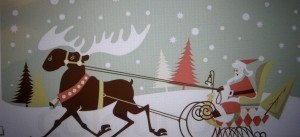25th December 1795.
The first celebrated Christmas in Britain is thought to have been in York in 521. So it was not among the earliest festivals of the church and the classical writers Irenaeus and Tertullian both omit it from their lists of feasts.(1)
The great diarist Parson Woodforde in his entry for Today December 25 1795, records the names of the people who joined him for dinner, whilst he left the administration of Holy Sacrament to a Mr. Corbould.
He recorded: ‘it hurt him to think that he could not do it himself, but suffering so much the last Christmas Day by the cold, he was afraid to go to church during the winter season’.
Christmas then was just another season in the religious calendar, celebrated communally, then in the Victorian revival as a family in the Dickensian fashion: no frenzied consumerism: little spare money to consume of what little there was available.
The Times newspaper in 1790 said of Christmas: ‘Within the last half century this annual time of festivity has lost much of its original mirth and hospitality’. A theme which was echoed by Charles Dickens in the Pickwick Papers (1836) as ‘little celebrated in these degenerate times’.
In the melting pot of the sacred rites and beliefs of the mythology of classical times, writers such as Virgil in his Eclogue, and before him Isaiah, in the Old Testament, were foretelling of a Saviour and Golden Age of Peace, which Christians were later to adopt, and to identify with, in the life of Jesus.
Virgil may well have been inspired by Jewish ideas of Golden Ages, which were transmitted to the West in the Sibylline Oracles, a mixture of Greek and Jewish mystical arcana.
Oracles were guarded in the Roman Temple of Jupiter Capitoline and consulted at times of peril with the Cumaean Sybil, who asked Apollo for eternal life, being the most important.
The message of the Sybils, not surprisingly was much quoted and adopted in the theology of the early Christian Church Fathers as they created a new and distinctive approach to a new religion.(2)
Thus notions of god-head ranged through many thought systems: Greek, Roman and Jewish. with the Gospel writers later choosing to draw upon Virgil in Christ’s Nativity narrative, and notions of immortality, found in the Delphic Cult of Dionysus, and deification of later Roman Emperors.(3)
(1a) Old English cristes maesse (1038) and Latin dies natalis.
(1b) The writer Origen, reflected on the discreditable Imperial Natalitia-‘sinners alone, not saints in celebrating birthdays’, and Arnobius could still ridicule the birthday of the gods.
(2) In medieval times twelve sybils were arranged in order of what they prognosticated in the Isabella Breviary.
(3) In the Delphic Cult of the holy birth at Eleusis.
Ref: Parson Woodforde’s Diaries.
Ref: googlebooks/Bruce David Forbes.2008 History.
Ref: historyextra.com/christmas-celebrations-old-versus-new.Prof.Arthur Perdue.17th December 2013.
